Clues to Australia’s Pre-Historic Climate Change Found in Field of Fossils

Scientists in Australia have announced new findings from a field full of fossils in northwest Queensland. The field was discovered last year and is near Riversleigh fossil field, which is a UNESCO World Heritage site.
According to Live Science, palaeontologists have identified several previously unknown species of marsupials and bats and they believe these discoveries could help in filling gaps in Australia's natural history.
It is believed the fossils were formed between five and 13 million years ago and are indicative of species otherwise missing from known fossil records. The scientists say the country may have boasted a warm and tropical climate at the time, compared to the more arid conditions present today.
"This was a critical time during which the widespread, lush, ancient rainforests of Australia rapidly gave way to increasingly drier conditions. At least some of these new deposits may help to fill out that critical 13-[million]-to-5-million-year-old gap," Mike Archer, one of the excavation's leaders, said.
Researchers also pointed out that a good deal of information about the change in environmental conditions could be derived from studying these fossils.
"The teeth of plant-eating species appear worn-down, suggesting that the animals lived during a time when vegetation on the continent had begun to transition from lush rainforests to the tougher flora of modern Australia," Archer continued.
"We anticipate that the new finds will soon be followed by many more, adding significantly to our understanding about how Australia transformed from an Amazon-like world to the dry continent we see today," he concluded.
© Copyright IBTimes 2024. All rights reserved.







